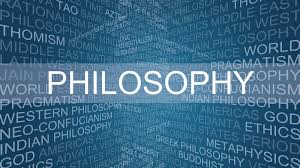
Week 2- What Philosophy is & why it is worth Studying
Meaning of Philosophy:
The word Philosophy is derived from two Greek words; Philo meaning love and Sophia meaning wisdom. In general, it means love of wisdom. Philosophy is a broad field of knowledge in which the definition of knowledge itself is one of the subjects investigated.
Philosophy is the study of general and fundamental problems, such as those connected with existence, knowledge, values, reason, mind, and language. Philosophy is the rational attempt to formulate, understand, and answer fundamental questions.
NATURE OF PHILOSOPHY
1. Philosophy is a set of views or beliefs about life and the universe, which are often held uncritically. We refer to this meaning as the informal sense of philosophy or “having” a philosophy. Usually when a person says “my philosophy is,” he or she is referring to an informal personal attitude to whatever topic is being discussed.
2. Philosophy is a process of reflecting on and criticizing our most deeply held conceptions and beliefs. These two senses of philosophy— “having” and “doing”— cannot be treated entirely independent of each other, for if we did not have a philosophy in the formal, personal sense, then we could not do a philosophy in the critical, reflective sense. Having a philosophy, however, is not sufficient for doing philosophy. A genuine philosophical attitude is searching and critical; it is open-minded and tolerant—willing to look at all sides of an issue without prejudice. To philosophize is not merely to read and know philosophy; there are skills of argumentation to be mastered, techniques of analysis to be employed, and a body of material to be appropriated such that we become able to think philosophically. Philosophers are reflective and critical.
3. Philosophy is a rational attempt to look at the world as a whole. Philosophy seeks to combine the conclusions of the various sciences and human experience into some kind of consistent world view. Philosophers wish to see life, not with the specialized slant of the scientist or the businessperson or the artist, but with the overall view of someone cognizant of life as a totality.
4. Philosophy is the logical analysis of language and the clarification of the meaning of words and concepts. . Certainly this is one function of philosophy. In fact, nearly all philosophers have used methods of analysis and have sought to clarify the meaning of terms and the use of language. Some philosophers see this as the main task of philosophy, and a few claim this is the only legitimate function of philosophy.
5. Philosophy is a group of perennial problems that interest people and for which philosophers always have sought answers. Philosophy presses its inquiry into the deepest problems of human existence. Some of the philosophical questions raised in the past have been answered in a manner satisfactory to the majority of philosophers.
MPORTANCE OF PHILOSOPHY
1. The study of Philosophy enables us to think carefully and clearly about important issues.
2. In studying Philosophy, we learn to take a step back from our everyday thinking and to explore the deeper, bigger question which underpins our thought.
3. The focus in the study of Philosophy is to learn not what to believe, but how to think.
4. Studying philosophy sharpens your analytical abilities, enabling you to identify and evaluate the strengths and weaknesses in any position.
BRANCHES OF PHILOSOPHY
Historically, philosophical concerns have been treated under these broad categories: 1. Logic 2. Metaphysics 3. Epistemology 4. Value theory


